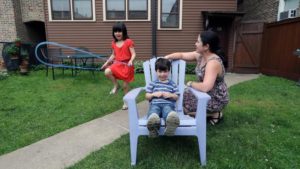How Seriously Should Parents Take Kids’ Opinions When Searching for a Home?
By Danielle Braff

In choosing a new home, Camille McClain’s kids had a single demand: a backyard.
That seemingly reasonable request turned the Chicago family’s home hunt upside down, as there weren’t many three-bedroom apartments on the North Side — where the family was looking — that came with yard space. Still, McClain and her husband chose to honor their 4- and 6-year-old’s request.
“We worked with a few apartment brokers, and it was strange that many of them didn’t even know if there was outdoor space, so they’d bring us to an apartment, we’d see that it didn’t have a yard, and we’d move on,” said McClain, who runs [business] in Lakeview, a business focused on music education for children.
McClain’s little ones aren’t the only kids who have an opinion when it comes to housing, and in many cases youngsters’ views weigh heavily on parents’ real estate decisions, according to a 2018 Harris Poll survey of more than 2,000 U.S. adults.
Fifty-five percent of homeowners who have a child under the age of 18 said the opinion of their child factored into their homebuying decision; 74 percent of millennial parents (those between the ages of 18 and 36) listened to their kids’ opinions before they bought their homes.
Renters paid attention to their kids’ preferences even more: 83 percent said their children’s opinions will be a factor when they buy a home.
The most common requests from kiddos? Fifty-seven percent want their own bedrooms; 34 percent want a large backyard; 25 percent want to be close to parks or other activities; 24 percent have an opinion about schools; 24 percent want to be near friends; and 21 percent want a swimming pool, according to the survey, which was commissioned by [company].
Pam Wynne, who is in the process of moving from the South Loop neighborhood to River Forest, said she and her husband asked their two elementary school-aged children for their opinions, took them to open houses and included them in all aspects of the house hunt.
“They have requested to have their own rooms, a basement, a nice yard and other kids to play with in the neighborhood,” Wynne said. “We have asked them what they would like in a house and have talked to our fourth-grader about starting a new school in an elementary school or entering in middle school — and how she feels about both.”
While more families buck an older-generation proclivity to leave kids in the dark about real estate decisions, realty agents and psychologists have mixed views about the financial, personal and long-term effects kids’ opinions may have.
The idea of involving children in a big decision is a great idea because it can help them feel a sense of control and ownership in what can be an overwhelming process, said [clinical psychologist] in Chicago.
“Children may face serious difficulties in coping with significant moves, especially if it removes them from their current school or support system,” he said.
But, he warns, one of the biggest dangers would be soliciting advice from kids when parents or guardians aren’t able to accommodate their requests. In that case, instead of feeling involved in the process, they might feel rejected or pushed away, Hooper said.
If you can’t act on their housing requests, he said, opt for clear communication about the move, including the reasons for relocating and what to expect.
[Real estate broker] with [real estate company] in River Forest, said he’s not convinced that kids should be involved in selecting a home — but their opinions should be considered in regards to proximity to friends and social activities, if possible.
“If they are into sports, clubs or music activities, they will likely need to be close to where those activities are held,” [real estate broker] said.
Younger children should feel like they’re choosing their home — without actually getting a choice in the matter, said Adam Leitman Bailey, real estate attorney based in New York and author of the upcoming children’s book “Home,” about the search for the perfect home from the viewpoint of a child.
Asking them questions about what they like about the backyard of a potential home — or asking them where their toys would go in the house — will make them feel like they’re being included in the decision-making process, Bailey said.
When it comes to younger children, he said, “most parents already know their desires and needs” and “moving decisions are likely at a level above the child’s thinking capacity when choosing a home.”

Many of the aspects of homebuying aren’t a consideration for children, said [real estate agent] based in Santa Clarita, Calif. And placing too much emphasis on their opinions can ruin a fantastic home purchase.
She has a client who has been house-hunting for a while, and he always asks his young children their opinion. But when this buyer finally decided to write an offer on a home with a pool, his children burst into tears because they didn’t want a pool.
“They ended up not submitting an offer,” [real estate agent] said. “So speaking with your children before you make a real estate decision is wise, but I wouldn’t base the purchasing decision solely on their opinions.”
The other issue is that many children — especially older ones — may base their real estate knowledge on HGTV shows, which tend to focus on superficial aspects of real estate, said [real estate agent] of [real estate agency] in Riverside, Calif.
“They love Chip and Joanna Gaines just as much as the rest of us,” he said. “HGTV has seriously changed how people view real estate. It’s not shelter, it’s a lifestyle. With that mindset change comes some serious money consequences.”
Kids tend to get stuck in the features and the immediate benefits to them personally, Norris said. And while their opinions on those elements shouldn’t reign supreme, the homebuying process could be a time to start talking to kids about money, budgeting, homeownership and other financial decisions.
“What are the costs of specific amenities and the ramifications of them?” [real estate agent] said. “We could get a pool or we could save the money on repairs, maintenance, electricity and insurance, and eat out more.”
Parents also need to remind their children that their needs and desires may change over time, said [real estate analyst] with [agency].
“Their opinions can change tomorrow,” [real estate analyst] said. “As harsh as it may be to say, that decision should likely not be made contingent on a child’s opinions, but rather made for them with great consideration into what home can meet their needs best — and give them an opportunity to customize it a bit and make it their own.”
This advice is more relevant now than ever before, even as more parents want to embrace the ideas of their children, despite the current housing crunch.
Today, wannabe homebuyers have to be more open when it comes to must-haves and what you can compromise on, [real estate analyst] said.
And speaking of compromise: The McClain kids, hungry for outdoor space, fell in love with a home in the North Park neighborhood that had a large yard. But it wasn’t ideal by their parents’ standards.
The family ended up renting a house in North Center that had a smaller yard, but it was still big enough for playtime.
“I had to do a bit of a sales job with the kids since they loved the yard in North Park,” McClain said. “But there’s a hammock they lounge on, a spot to jump rope, a place to play in the sprinkler, and an area to write with sidewalk chalk.”